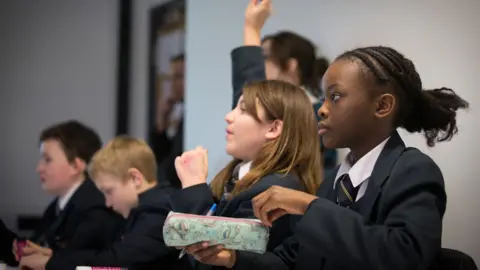Schools 'desperately need' cash injection, MPs say
 Getty Images
Getty ImagesSchools and colleges in England need a "multi-billion cash injection" and a long-term approach to funding, say MPs on the Education Select Committee.
Its report on school funding confirms the concerns of head teachers and teachers' unions who have protested about worsening budget shortages.
The committee found that schools and colleges "desperately need" extra cash.
A Department for Education spokeswoman accepted that schools were facing "budgeting challenges".
ASCL head teachers' union leader Geoff Barton, said the report was a "damning indictment of the government's dreadful record" on school funding.
Spending gap
Robert Halfon, who chairs the committee, said the report showed the need for a "comprehensive, bottom-up national assessment" of what it really cost to have an "education system fit for the 21st Century".
The cross-party report says that schools have faced increased financial pressures from rising numbers of pupils and growing demands, such as supporting more pupils with mental health problems.
MPs say funding "has not kept pace" and the government needs to put in more cash.
"The government needs to cover the 8% funding gap currently faced by schools," says Mr Halfon, with the report saying this would require a "£3.8bn uplift".
 Getty Images
Getty ImagesFurther education colleges have faced particular problems, says the report, with per student funding falling by 16% in real terms over the past decade for the post-16 age group.
The MPs say funding for this age group, in sixth forms and colleges, needs a £1bn boost, and the pupil premium, which gives extra support for disadvantaged youngsters, should be extended to 16- to 19-year-olds.
The committee's report also calls for extra support for pupils with special needs and disabilities, to tackle a "projected £1.2bn deficit".
'Horse-trading'
There have been long-running protests by school leaders over funding shortages - including a protest march by head teachers through Westminster and letters sent to millions of parents.
Jules White, the West Sussex head teacher who organised the WorthLess? school funding protest, said "a cross-party group of MPs have validated what we have been saying all along - namely that our schools and colleges have been crippled by cuts and rising costs".
Tory leadership contender Boris Johnson has promised increased investment in schools - and there have also been claims that the Prime Minister, Theresa May, wants to announce a funding boost for schools before stepping down.
Former Education Secretary Justine Greening attacked the "horse-trading" over school funding, saying it should not be decided by short-term political pressures.
Labour's shadow education secretary, Angela Rayner, said spending cuts had "left schools begging parents for donations just to keep the lights on five days a week and pay for basic supplies like pens and paper".
A spokeswoman for the Department for Education said: "While it is accurate to say that school funding is at its highest level, we do recognise that there are budgeting challenges.
"We are glad to see that school and further education funding is being highlighted as an important issue ahead of the next spending review, where the education secretary will back the sector to have the resources they need."
